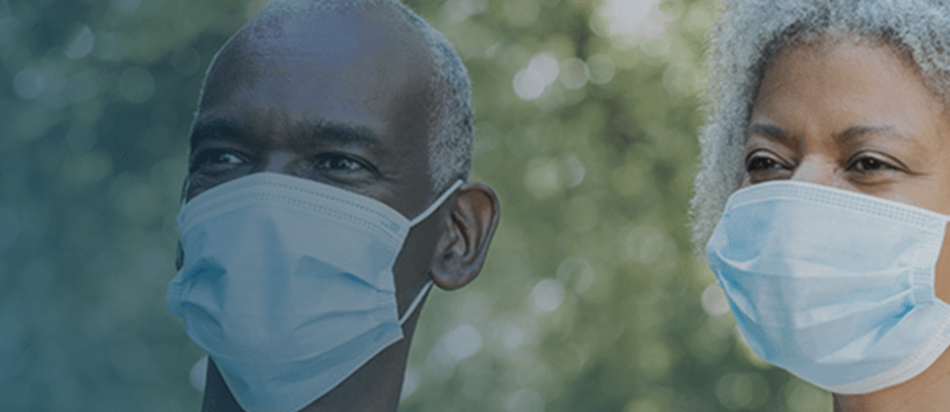Monoclonal antibodies are one of several therapeutic options to help fight COVID‑19. Learn more about the other possible treatment options.
If you are at risk for serious COVID-19 and you have tested positive for COVID-19 or have been in close contact with someone who has tested positive, you may want to consider a monoclonal antibody (mAb) treatment. You may qualify for the mAb treatment (bebtelovimab) depending on your age, health history, and how long you have had symptoms.
The mAb treatment can block the virus that causes COVID-19 from entering cells in your body and limit the amount of the virus within your body. This means you may have milder symptoms and may decrease the likelihood of you needing to stay in the hospital.
A mAb treatment may help people who:
- Are at high risk of getting more serious symptoms and
- Have a positive COVID-19 test with symptoms for 7 days or less (bebtelovimab) or
- Have been in close contact with someone who has recently tested positive
This page describes mAbs, how they can prevent mild to moderate symptoms from getting worse, and what to expect if you get a mAb treatment. This treatment is for if other COVID-19 treatment options approved or authorized by the FDA are unavailable or not clinically appropriate.
Have symptoms, but no healthcare provider? Call the Combat COVID Monoclonal Antibodies Call Center at 1-877-332-6585.
WHAT IS A MONOCLONAL ANTIBODY?
Your body naturally makes antibodies to fight infection. However, your body may not have antibodies designed to recognize a novel (or new) virus like SARS-CoV-2, the virus that causes COVID-19. Monoclonal antibodies, or mAbs, are made in a laboratory to fight a particular infection (in this case, SARS-CoV-2) and are given to you directly in an infusion. So the mAb treatment may help if you are at high risk for serious symptoms or a hospital stay.
The mAb treatment for COVID-19 is different from a COVID-19 vaccine. The vaccine triggers your body’s natural immune response, but this can take weeks to develop enough antibodies against a virus. So if you have the virus, the mAb treatment gives your body the antibodies it needs to protect itself. The mAb treatment does not replace the need for the immunity from the vaccine but it can help you if you are at risk for developing serious COVID-19.
How Can I Get Monoclonal Antibodies?
To receive a mAb you should be referred for treatment by your healthcare professional and directed to available infusion locations. If you do not have a healthcare provider, call the Combat COVID Monoclonal Antibodies Call Center at 1-877-332-6585 to find out who to talk with about your symptoms and treatment.
WHAT IF I DO NOT QUALIFY FOR MONOCLONAL ANTIBODY TREATMENT?
Your healthcare professional may decide you do not qualify for mAb treatment. There could be several reasons for this. You may not meet all eligibility criteria or you may have an underlying health condition that disqualifies you for mAb treatment.
Whatever the reason is, do not give up. There could be another option. You may be eligible to receive a different treatment option such as oral antivirals or join a clinical trial for COVID-19.
Ask your healthcare professional if you may be eligible for a clinical trial for COVID-19 treatments. To learn more about clinical trials:
WHAT CAN I EXPECT FROM MONOCLONAL ANTIBODY TREATMENT?
The mAb treatment is usually offered at an infusion center because the treatment is given through a vein in your body (IV infusion) or as a shot (injection) or shots (series of injections). Depending on the mAb treatment you receive, the whole process takes about 1-3 hours.
First, the medical staff conduct a health screening; then they start an IV, which delivers the mAbs to your body in just over an hour. It takes less time if the mAb treatment is offered to you as a series of shots.
Afterward, the medical team will have you stay at the infusion center for another hour to be sure you do not have an allergic reaction or any other side effects. These reactions are rare, but the medical team must observe you for this hour and can respond quickly if you have a reaction.
You will be released to go home after the medical team has monitored you following your infusion.
Even if you start feeling better, it is important to know that you could still spread the virus for a while. So, you will need to isolate yourself (be alone) until all of these things happen:
- At least 5 days have passed since your first symptoms of COVID-19
- You have not had a fever in at least 24 hours, without taking any medicine that reduces fever
- Your other symptoms of COVID-19 are improving
IMPORTANT: Follow your healthcare professional’s instructions. Depending on your personal health history, you may need to meet other conditions. Also, if you start to feel worse, do not hesitate to seek medical care.

CAN MONOCLONAL ANTIBODY TREATMENT MAKE ME SICK?
Antibody treatments do not contain any live virus, so there is no risk you will get COVID-19 from mAb treatment. However, the antibody treatment may have side effects:
- Allergic reactions can happen during and after an antibody infusion. Tell your healthcare professional right away if you get any of the following signs and symptoms of an allergic reaction: fever, chills, nausea, headache, shortness of breath, low or high blood pressure, rapid or slow heart rate, chest discomfort or pain, weakness, confusion, feeling tired, wheezing, swelling of your lips, face, or throat, rash including hives, itching, muscle aches, feeling faint, dizziness, and sweating.
- An infusion of any medicine may cause brief pain, bleeding, bruising of the skin, soreness, swelling, and possible infection at the infusion site.
These are not all the possible side effects of antibody treatment. Serious and unexpected side effects may happen. Some possible risks from antibody treatment are:
- It may interfere with your body’s ability to fight off a future infection of COVID-19.
- It may reduce your body’s immune response to a vaccine for COVID-19.
The mAb treatments for COVID-19, like other treatments authorized for emergency use by the U.S. Food and Drug Administration, are still being studied. So it is possible that we do not know all the risks yet. As researchers continue to study COVID-19 and how mAb treatment affects it, we will learn more about these possible risks. If you have any questions, please talk with your healthcare professional.

